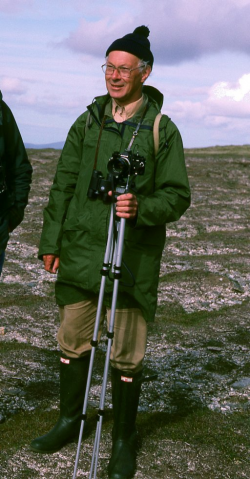Dr Derek Ratcliffe

Derek Ratcliffe
- Born
- 9 July 1929
- Died
- 23 May 2005 (age 75)
Derek Ratcliffe was one of the most significant nature conservationists in Britain in the twentieth century and he created the framework for modern conservation. He was the first person to discover the link between the use of pesticides and the decline in numbers of birds of prey, particularly the Peregrine Falcon.
After national service and his PhD, he joined the Nature Conservancy Council (NCC). He became chief scientist for the NCC in 1973, a position he held until he retired. It was during the 1960s and 1970s that he became aware of the changing nature of the countryside, and he took the opportunity to undertake an inventory of Britain’s most wild places, and the most important sites for nature conservation. It was the most thorough survey of its kind and led to the publication of the Nature Conservation Review in 1977. This book was the foundation of modern nature conservation in Britain and has set the standard across Europe.
Ratcliffe wrote a number of books and also produced the guidelines for the selection of Sites of Special Scientific Interest (SSSIs) that was published in 1984. Britain’s network of National Nature Reserves (NNRs) and SSSIs were set up under his guidance. There are now more than 6,500 SSSIs across Britain and more than 340 NNRs.
Ratcliffe championed the importance of nature as a cultural asset, a view that is accepted today but which was seen as a radical approach at the time. In the 1980s, he helped to persuade the Government to cut the tax advantages for planting non-native conifers on Scottish peat bogs, which was threatening large wetland areas.
His intellectual contribution to the selection and conservation of protected areas was immense, and inspired the nature conservation movement
He is also known for his work on the effects of organo-chlorine pesticides on birds of prey. In the 1960s, he led a survey for the British Trust for Ornithology, to assess the status of the Peregrine Falcon, which was declining rapidly. He had noticed that Peregrines and other birds often had broken eggs in their nests, and that they were also having fewer clutches than previously.
Ratcliffe investigated many egg collections from the present and past, and established that the shells were growing thinner. The shells had started to thin at the time that DDT was used widely in agriculture.
This was the most detailed evidence of the effect of pesticides on wildlife and Ratcliffe’s papers on the subject led to hundreds of follow up studies around the world. His studies were replicated in many other regions where organo-chlorine pesticides had been used. This led to an international campaign against them and progressive restrictions on their use were introduced over the following decades, with an EU ban on the use of dieldrin in 1981 and DDT in 1986.
He was awarded the British Trust for Ornithology’s Bernard Tucker Medal in 1964.
His PhD work on the mountain vegetation of Snowdonia has been revisited this century to help understand the impacts that pollution has on mountain environments.



